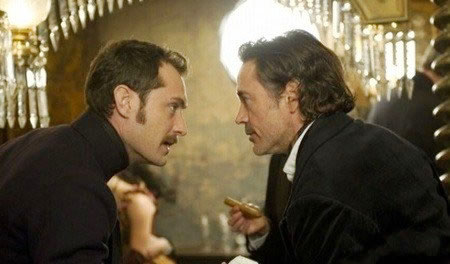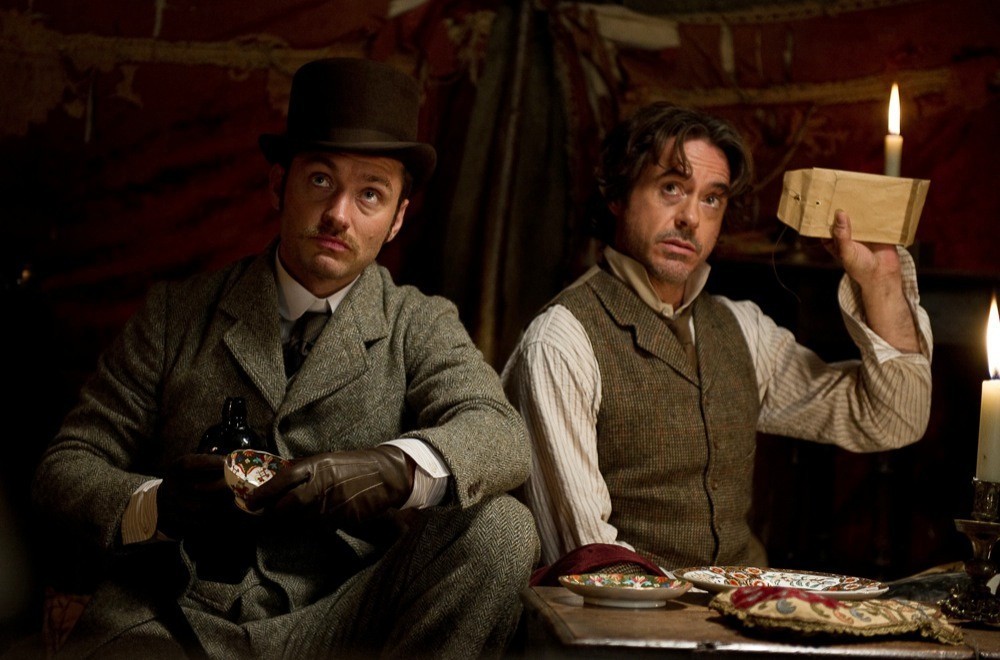
With our protagonist’s chief arch-nemesis, Professor Moriarty, emerging from the darkness for his curtain call, Guy Ritchie’s lazy, loud Sherlock Holmes: A Game of Shadows should be The Dark Knight to the first film’s Batman Begins. It is, only to the extent that Ritchie et al have continued to make of Holmes a Victorian-Era Batman, cursed with observational and deductive skills so overpowering that he can basically see the future and single-handedly beat up crowds of thugs like it’s Arkham City. Otherwise, unfortunately, they’ve made a hash of it. In short, this is more like the Iron Man 2 to the first film’s Iron Man.
When the better-than-expected first movie appeared during Xmas 2009, the Guy Ritchification of Sherlock Holmes seemed like an innovative approach to Arthur Conan Doyle’s mythos, one that found room for 21st century action movie conceits within the material of the original stories. But, perhaps in part because that approach is no longer fresh this time, or perhaps because Stephen Moffat’s team has managed to rejuvenate the character more traditionally on BBC, A Game of Shadows is much less entertaining — I found the first hour almost unwatchable. The best thing you can say about it is that it gets better as it goes along.
A Game of Shadows begins far too frenetically, with Sherlock (Robert Downey Jr.) trying to intercept his love interest from the first film, Irene Adler (Rachel McAdams), as she delivers what very well could be a parcel bomb on orders from the dastardly Professor Moriarty. (Jared Harris, the best thing here by far.) Plenty of worthwhile action movies begin with this sort of in media res setpiece, going back to Raiders of the Lost Ark and including the first film (when Holmes and Watson, iirc, prevent some sort of satanic ritual perpetrated by Mark Strong’s Big Bad.) But here, the tone and pacing feel off from the start, with Ritchie-being-Ritchie, an endlessly mugging Downey, and the bombastic soundtrack all trying to oversell us on the antic mischief at hand.
Game of Shadows continues in this unfortunate vein for most of the next hour, lurching frantically from setpiece to setpiece — Watson’s bachelor party, Watson’s honeymoon on a train, a Roma camp, the Paris Opera — but never establishing any compelling interest in the goings-on. (Along the way they pick up mysterious gypsy Noomi Rapace, who adds very little — although it’s not really her fault.) Seriously, this first half of the film is close-to Van Helsing-bad.
It doesn’t help that Holmes’ powers of deductive ass-kickery only seem to have strengthened during the interstice between films: In terms of extra-sensory fighting style, he might as well be Daredevil at this point. In terms of problem-solving — for example, when he finds that secret door in the Paris catacombs — he’s Professor X, doing more mind-reading than solving puzzles. (Also, despite the fact that he’s meant to be the world’s greatest detective, I’m not sure Holmes asks anyone a single question over the entire course of the movie.)
All that being said, the movie does begin to pick up in the back end — right around the time Holmes and Watson stop by a German munitions factory. (There are still some groaners to be had later. I’m looking at you, epipen.) This is mainly because, for one, all the nameless goons get left behind and the supervillains of the piece, matching our heroes in absurd power, move to the fore: Moriarty seems to have Joker-in-TDK-like levels of prescience, and his #2, Col. Sebastian Moran (Paul Anderson), becomes, for all intent and purposes, Deadshot. For another, the movie wisely borrows dramatic heft from staging its final act at Reichenbach Falls — and, indeed, it’s the battle-of-wits between Holmes and Moriarty atop those fateful falls that makes for the most engaging scene in the film.
Still, it’s a real slog to get to Reichenbach, with only Harris’s mannered malevolence as Moriarty offering any respite for much of the way. (Well, Law’s not bad, either, but by design he takes a back seat to the more manic and off-kilter Downey. And Stephen Fry, in a dream role as Mycroft Holmes, is unfortunately wasted.) Holmes fans will know that the story much of this movie was drawn from, “The Final Problem,” turned out to be not-so-final after all. If A Game of Shadows is what we can expect from the rest of this franchise, here’s hoping this film is more successful at bringing the curtain down on this iteration of Holmes. Mr. Cumberbatch, you are needed.

